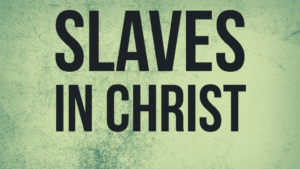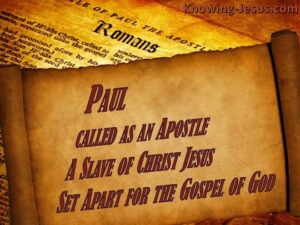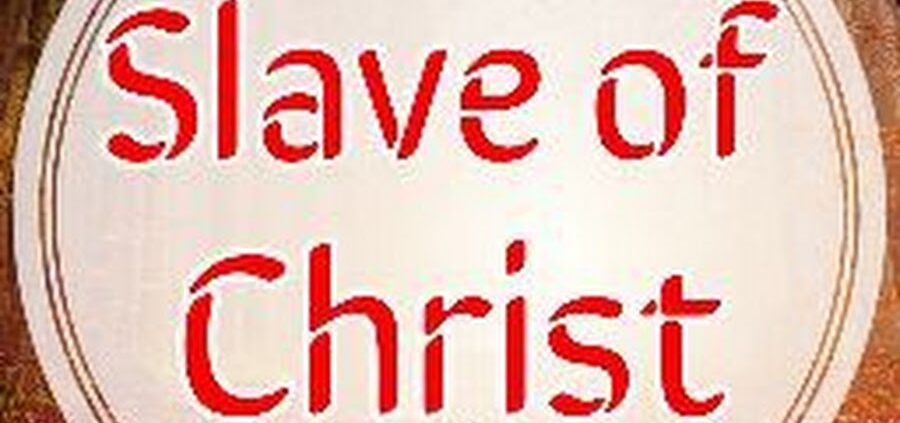The Preacher’s Identity Is As A Slave
The Preacher’s Identity Is As A Slave
In the last couple of posts we have been looking at the preacher’s identity. How does the preacher look at himself or herself? We’ve seen that we are “under-rowers”, and that we are “keepers of the mysteries of Christ”. In this post we are going to see that the preacher’s identity is as a slave to Jesus Christ.
Story of a Slave
I once was part of a group of 10 larger church pastors who came from all over the United States and Canada to meet for three days each January to learn from each other and encourage each other. We took turns planning the meetings. One year, the pastors who were in charge chose to have a book discussion on the book, Let Your Life Speak, by  Parker Palmer. Each of us in turn around the circle shared how God formed us, and how our present place of ministry fit the way God created us.
Parker Palmer. Each of us in turn around the circle shared how God formed us, and how our present place of ministry fit the way God created us.
Then it came time for my closest friend to share. At the time he pastored a church of a little over 1500 people, and with a large staff. He also led the church through a relocation and through consistent growth for almost 20 years. To everyone’s surprise, he said something like, “I don’t think this book describes me at all. If I were to do what comes naturally to me, I’d work in a greenhouse by myself with flowers and plants.” He then said, “But I don’t just do what comes naturally to me. You see, I have a Master, and he called me to this work. So, I go.”
My friend’s statement has come to me often over the years as I reflected that the identity of the preacher is as a slave of Christ.
The Identity As A Slave According to Jesus
That is the attitude of the slave. Here is a definition of the Greek word doulas as it is used in the New Testament:.
| Definition | |
|
In other words, the slave is someone who advances his master’s will and cause, not his own. Most often this word  doulas is translated as “servant”, but that gives too light an emphasis, I think. A slave is a slave. Consider this word by Jesus in Luke 17:10 in a parable about the duty of the disciple. He says,
doulas is translated as “servant”, but that gives too light an emphasis, I think. A slave is a slave. Consider this word by Jesus in Luke 17:10 in a parable about the duty of the disciple. He says,
Suppose one of you has a servant (doulas) plowing or looking after the sheep. Will he say to the servant when he comes in from the field, ‘Come along now and sit down to eat’? Won’t he rather say, Prepare my supper, get yourself ready and wait on me while I eat and drink; after that you may eat and drink. Will he thank the servant because he did what he was told to do? So you also, when you have done everything you were told to do, should say, ‘We are unworthy servants; we have only done our duty.’
That is the attitude of the slave. I’m a preacher not because I think it is a good way to advance my career, or to get rich, or to become more influential. I’m a preacher because my Master has told me to be one. And I seek to serve Christ, not be served by people.
Paul’s Identity As A Slave
 Paul spoke in a similar way. In I Corinthians he is giving a list of all his “rights” as an apostle. However, this is what he says after that:
Paul spoke in a similar way. In I Corinthians he is giving a list of all his “rights” as an apostle. However, this is what he says after that:
This was something he did because his Master called him to it, and he, as a good slave, obeyed.
Seeing Yourself As A Slave
This word doulas appears over 150 times in the New Testament, and so, this is a very cursory treatment of the idea of being Christ’s slave. However, I have found it helpful to view myself that way.
As a slave, I do not own. Jesus owns me. A slave also doesn’t have any “rights”, something so many claim these days. Slavery also means that the only reward I get is something that the master gives. Slaves give up themselves and become totally focused on the Master.
So, preacher, think of yourself as a slave. Jesus is the Master, you are the slave, the one who serves without thinking about reward. Reflect on the truth that the preacher’s identity as a slave of Christ, and your ministry will be enriched.
John MacArthur reflects on this identity of a slave in this great video.



